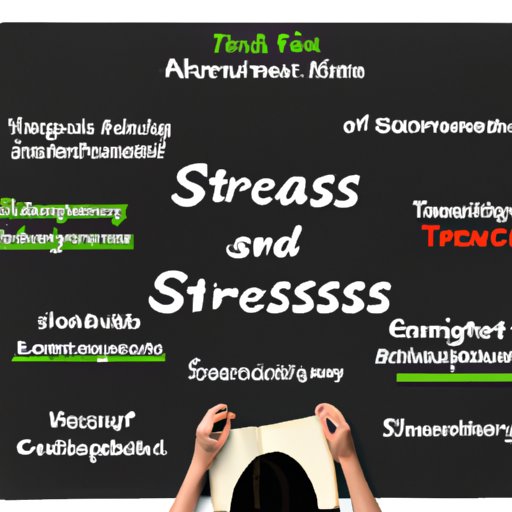
I. Introduction
Stress is a normal part of life, but when it becomes chronic and long-lasting, it can have detrimental effects on both mental and physical health. In this article, we will explore what long-term stress is, its impact on mental and physical health, its symptoms and causes, and ways to manage it. It is essential to understand the concept of long-term stress, its effects and identify strategies to cope with it in everyday life.
II. Defining Long-Term Stress: Understanding the Concept and Its Impact on Mental Health
Long-term stress is a type of stress that occurs over an extended period, such as months or years. It is usually caused by circumstances that are difficult to change, such as relationship problems, work stress, or financial difficulties. Chronic stress can have a variety of negative effects on mental health, including anxiety, depression, and burnout. Distinguishing between short-term and long-term stress is important to understanding its impact on mental health.
III. The Symptoms and Causes of Long-Term Stress
Long-term stress presents with a range of symptoms that vary from person to person. Some of the common signs of long-term stress include fatigue, irritability, difficulty concentrating, changes in appetite, and disturbed sleep. A few leading causes of long-term stress include difficult relationships, work pressure, financial strain, and traumatic experiences. These stressors can have a significant impact on daily life and can lead to physical and emotional problems.
IV. How to Manage Long-Term Stress with Lifestyle Changes
Managing long-term stress requires changes in lifestyle habits. Engaging in regular physical activity, practicing relaxation techniques, maintaining a healthy diet, and getting enough sleep are some effective ways to manage long-term stress. It is critical to take extra care of oneself during stressful times, including setting boundaries, prioritizing activities, and taking breaks to rest and relax.
V. Long-Term Stress and Physical Health: A Comprehensive Look
Not only does long-term stress impact mental health, but it also has physical health consequences. Long-term stress can compromise the immune system, cause chronic pain, and increase the risk of many chronic illnesses such as heart disease, diabetes, and cancer. Managing long-term stress is crucial for overall physical wellbeing and reducing the risk of adverse health outcomes.
VI. Breaking the Cycle of Long-Term Stress: Coping Strategies and Resources
Breaking the cycle of long-term stress requires identifying coping strategies that work for each person. Some people find it helpful to talk to a friend or professional, while others prefer yoga or meditation. Developing a support system is a crucial component of breaking the cycle of long-term stress and accessing appropriate mental health resources. There are many useful resources available for those who need support and guidance.
VII. The Link Between Long-Term Stress and Mental Illnesses: Seeking Professional Help
Long-term stress can increase the risk of developing mental illnesses such as anxiety and depression. Seeking professional help can be instrumental for individuals struggling with long-term stress and its effects. It is essential to know that there is no shame in seeking help, and it can be a pivotal step towards managing long-term stress. Mental health services that specialize in stress management can provide resources and help maintain mental wellbeing throughout the challenging times.
VIII. Conclusion
The negative effects of long-term stress on both mental and physical health cannot go unnoticed. Chronic stress is becoming more prevalent in modern life, and it is essential to take steps to address it before it spirals out of control. In conclusion, it is crucial to understand the concept of long-term stress, its effects on mental and physical health, potential causes, and strategies to prevent or manage it. Taking care of oneself, seeking help, and utilizing resources available are the first steps to breaking the cycle of long-term stress and achieving improved mental and physical health.





